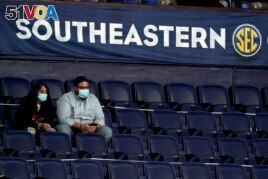19 March 2021
The large college basketball tournament in the U.S., known as "March Madness" begins this week. The men's tournament is being held in the state of Indiana and the women's tournament is in Texas.
Both tournaments are letting fans attend games. And all games are being held indoors.
During the coronavirus pandemic, very few people have been permitted at indoor sporting events in the United States. But that is changing as more people are being vaccinated against the virus and COVID-19 is spreading a bit more slowly.
Most of the indoor arenas that will let fans watch games in person are very large. They can hold about 20,000 people. However, during the pandemic, attendance will be limited to about 25 percent. Fans will have to wear face coverings. Fans who do not know each other will not be permitted to sit together. And the arenas will work to make sure fresh air comes in with strong air movement systems.

Fans wear masks and sit in marked-off seats at an NCAA college basketball game in the Southeastern Conference tournament Wednesday, March 10, 2021, in Nashville, Tenn.
But are these events safe to attend?
Allen Hershkowitz is an environmental scientist. He said he would go to an indoor sporting event as long as other people in attendance follow the rules.
"Given the protocols, I would feel OK about it," he said.
The arenas are very high from floor to ceiling. Experts say this helps with safety.
Richard Corsi is the head of Portland State University's College of Engineering and Computer Science. He said "I think the risks are probably very low" if people follow the rules, stay apart from each other and keep their faces covered unless they are eating or drinking.
Ryan Gensler is the director of sports for a firm that designs large arenas. He said most buildings built in the last 20 years that hold sporting events already have good systems for moving and cleaning the air. They were built that way in order to improve the experience for people watching the games, not because of any pandemic worries.
Ana Rule is an assistant professor at Johns Hopkins University. She said large indoor arenas like Lucas Oil Stadium in Indianapolis have a lot of air. Lucas Oil Stadium will hold the last three games of the men's college basketball tournament. It can seat about 75,000 people. But during March Madness, only 17,500 fans will be able to attend each game.
She explained that particles that go into the air when people breathe will have room to spread out. "So that helps," she said.
Shandy Dearth studies diseases for a large university in Indianapolis. She said if COVID-19 case numbers were still rising without control, it would not be a good idea to let fans attend games. But the conditions are now improving. She said people still should not gather in large groups as they arrive at the games. And they should continue to wear face coverings.
"We've got a lot of lessons learned from the last year," Dearth said, "so it's not an experiment. I think we know enough now to know what we need to do."
I'm Dan Friedell.
Stephen Whyno wrote this story for the Associated Press. Dan Friedell adapted it for Learning English. Ashley Thompson was the editor.
Are fans permitted at indoor sporting events where you live? We want to hear from you. Tell us in the Comments Section and visit 51VOA.COM.
_________________________________________________________________
Words in This Story
tournament –n. a sports competition or series of contests that involves many players or teams and that usually continues for at least several days
madness –n. a state of extreme distress or excitement; mental illness
arena –n. a building for sports and other forms of entertainment that has a large central area surrounded by seats
protocol –n. a system of rules that explain the correct conduct and procedures to be followed in formal situations
ceiling –n. the inside surface at the top of a room